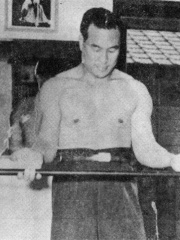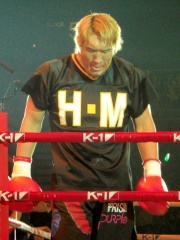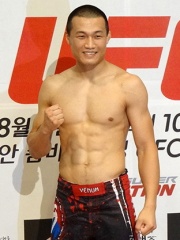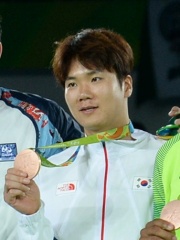







The Most Famous
MARTIAL ARTS from South Korea
This page contains a list of the greatest South Korean Martial Arts. The pantheon dataset contains 179 Martial Arts, 10 of which were born in South Korea. This makes South Korea the birth place of the 7th most number of Martial Arts behind France, and Germany.
Top 10
The following people are considered by Pantheon to be the top 10 most legendary South Korean Martial Arts of all time. This list of famous South Korean Martial Arts is sorted by HPI (Historical Popularity Index), a metric that aggregates information on a biography's online popularity. Visit the rankings page to view the entire list of South Korean Martial Arts.

1. Mas Oyama (1923 - 1994)
With an HPI of 72.71, Mas Oyama is the most famous South Korean Martial Arts. His biography has been translated into 34 different languages on wikipedia.
Masutatsu Ōyama (born Choi Yeung-eui; 27 July 1923 – 26 April 1994), commonly known outside Japan as Mas Oyama, was a Korean-Japanese karateka. He was the founder of Kyokushin Karate, considered the first and most influential style of full contact karate.

2. Hongman Choi (b. 1980)
With an HPI of 50.52, Hongman Choi is the 2nd most famous South Korean Martial Arts. His biography has been translated into 16 different languages.
Choi Hong-man (Korean: 최홍만; born October 30, 1980), often anglicised to Hongman Choi, is a South Korean kickboxer, mixed martial artist, and former ssireum wrestler. In Asia, he is called "Che Man", "Techno Goliath", "Korean Monster" and "Korean Colossus". He won the 2005 K-1 Seoul Grand Prix beating Kaoklai Kaennorsing in the finals. He stands 2.18 m (7 ft 2 in) and weighs 160 kg (350 lb; 25 st 3 lb).

3. The Korean Zombie (b. 1987)
With an HPI of 48.63, The Korean Zombie is the 3rd most famous South Korean Martial Arts. His biography has been translated into 16 different languages.
Jung Chan-sung (Korean: 정찬성; born March 17, 1987), anglicized as Chan Sung Jung and better known professionally as The Korean Zombie, is a South Korean former professional mixed martial artist best known for competing in the Featherweight division of the Ultimate Fighting Championship (UFC). A professional competitor since 2007, Jung had also competed for World Extreme Cagefighting (WEC), Pancrase, World Victory Road, and DEEP. His nickname, "The Korean Zombie", comes from his perceived zombie-like ability to continue to move forward and fight aggressively, even after taking heavy blows.

4. Ha Hyung-joo (b. 1962)
With an HPI of 46.49, Ha Hyung-joo is the 4th most famous South Korean Martial Arts. His biography has been translated into 18 different languages.
Ha Hyung-joo (born 3 June 1962), also known by Ha Hyoung-zoo, is a retired judoka from South Korea. In 1981, he became the first open division champion to represent South Korea at the Asian Judo Championships in Jakarta. Ha represented South Korea at the 1984 Summer Olympics, and claimed the gold medal in the men's half heavyweight division (–95 kg) by defeating Brazil's Douglas Vieira in the final. Ha also competed at the 1988 Summer Olympics, but did not win a medal. Ha retired shortly after the Seoul Olympics and has been working as a physical education professor at Dong-A University.

5. Yoon Hyun (b. 1966)
With an HPI of 45.19, Yoon Hyun is the 5th most famous South Korean Martial Arts. His biography has been translated into 15 different languages.
Yoon Hyun (born 5 April 1966) is a South Korean judoka. Yoon won a silver medal in the extra lightweight division (–60 kg), losing to Nazim Huseynov from Azerbaijan in the final in the 1992 Summer Olympics. Yoon also won two World Championships medals in 1989 and 1991.

6. Cha Dong-min (b. 1986)
With an HPI of 42.16, Cha Dong-min is the 6th most famous South Korean Martial Arts. His biography has been translated into 18 different languages.
Cha Dong-min (Korean: 차동민; Korean pronunciation: [tɕʰa.doŋ.min]; born August 24, 1986) is a retired South Korean taekwondo practitioner.

7. Jung Bu-kyung (b. 1978)
With an HPI of 40.60, Jung Bu-kyung is the 7th most famous South Korean Martial Arts. His biography has been translated into 14 different languages.
Jung Bu-kyung (Korean: 정부경; Hanja: 鄭富競 born 26 May 1978) is a South Korean judoka and professional mixed martial artist.

8. Kim Seon-young (b. 1979)
With an HPI of 40.32, Kim Seon-young is the 8th most famous South Korean Martial Arts. Her biography has been translated into 14 different languages.
Kim Seon-young (born 23 February 1979) is a South Korean former judoka who competed in the 2000 Summer Olympics.

9. Jang Ji-won (b. 1979)
With an HPI of 39.00, Jang Ji-won is the 9th most famous South Korean Martial Arts. Her biography has been translated into 14 different languages.
Jang Ji-won (Korean: 장지원; born August 30, 1979) is a South Korean Taekwondo practitioner who competed at the 2004 Summer Olympics. She won the gold medal in the 57 kg division.

10. Park Hee-jun (b. 1994)
With an HPI of 18.69, Park Hee-jun is the 10th most famous South Korean Martial Arts. His biography has been translated into 4 different languages.
Park Hee-jun (born March 29, 1994) is a South Korean senior male karateka. The 24-year-old became the first South Korean to win an Asian Games medal in kata, a non-sparring event in which practitioners demonstrate the Japanese martial art’s patterns and movements. Since karate became an Asiad medal sport, South Korea has won eight bronze medals over the last six Asian Games, all in kumite, a sparring discipline. He placed third in the Karate1 Premier League's 2014 Jakarta tournament.
People
Pantheon has 10 people classified as South Korean martial arts born between 1923 and 1994. Of these 10, 9 (90.00%) of them are still alive today. The most famous living South Korean martial arts include Hongman Choi, The Korean Zombie, and Ha Hyung-joo. The most famous deceased South Korean martial arts include Mas Oyama. As of April 2024, 4 new South Korean martial arts have been added to Pantheon including Yoon Hyun, Jung Bu-kyung, and Kim Seon-young.
Living South Korean Martial Arts
Go to all RankingsHongman Choi
1980 - Present
HPI: 50.52
The Korean Zombie
1987 - Present
HPI: 48.63
Ha Hyung-joo
1962 - Present
HPI: 46.49
Yoon Hyun
1966 - Present
HPI: 45.19
Cha Dong-min
1986 - Present
HPI: 42.16
Jung Bu-kyung
1978 - Present
HPI: 40.60
Kim Seon-young
1979 - Present
HPI: 40.32
Jang Ji-won
1979 - Present
HPI: 39.00
Park Hee-jun
1994 - Present
HPI: 18.69
Deceased South Korean Martial Arts
Go to all RankingsNewly Added South Korean Martial Arts (2025)
Go to all RankingsYoon Hyun
1966 - Present
HPI: 45.19
Jung Bu-kyung
1978 - Present
HPI: 40.60
Kim Seon-young
1979 - Present
HPI: 40.32
Jang Ji-won
1979 - Present
HPI: 39.00

